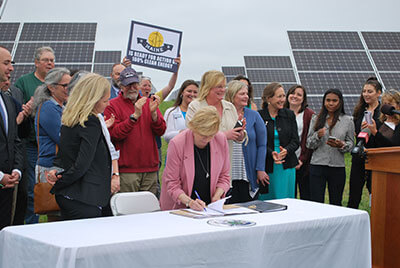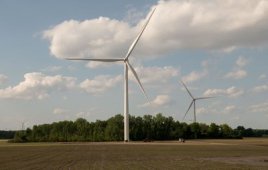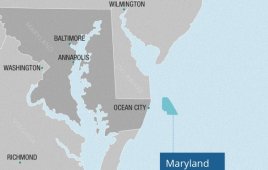Maine Governor Janet Mills signed three major pieces of bipartisan legislation into law this week that will help usher in renewable energy in the state. The new bills establish in law the Governor’s proposed Maine Climate Council, which is charged with developing action plans to reduce Maine greenhouse gas emissions by 45% by 2030 and 80% by 2050.

The bill signing ceremony was held at the largest solar array in the state, a 10-MW solar project in Pittsfield, Maine. Learn more about the legislations here.
This is an increase in Maine’s renewable portfolio standard (RPS) from 40% today to 80% by 2030 and a goal of 100% renewable energy by 2050.
The bills also build on several steps taken by Governor Mills to spur renewable energy development, including directing the Public Utilities Commission to approve the contract for Maine Aqua Ventus, the first of its kind demonstration project of floating offshore wind in the United States.
The bill was signed in conjunction with an announcement of Maine’s participation in a federally-led Gulf of Maine Intergovernmental Regional Task Force on renewable energy and the creation of a state-led Maine Offshore Wind Initiative.
“With the signing of these bills, Maine is ushering in a new era of clean energy and climate leadership,” said Governor Mills. “The Maine Climate Council will develop comprehensive action plans to meet our ambitious emissions reductions goals and the renewable energy legislation will spur clean energy development and investments that will increase production of homegrown, renewable energy and create good paying jobs for the people of Maine. Maine is once-again leading on clean energy.”
The legislation will significantly increase the amount of renewable energy in Maine, reduce emissions, and support clean energy job growth:
- LD 1679: An Act to Promote Clean Energy Jobs & to Establish the Maine Climate Council. This is a Governor’s bill sponsored by Senator David Woodsome, which will establish the Maine Climate Council. The Council will develop the action plans to meet the state’s greenhouse gas reduction goals, to promote jobs and economic benefits for Maine people in the transition to a lower carbon economy, and to support the climate resiliency of Maine’s communities. Governor Mills proposed establishing the Maine Climate Council in April.
- LD 1494: An Act to Reform Maine’s Renewable Portfolio Standard. Sponsored by Senator Eloise Vitelli, this bill significantly increases Maine’s RPS. The bill also requires the Public Utilities Commission to procure long-term contracts for new clean energy generation, which may be paired with advanced energy storage. Additionally LD 1494 requires the creation of a new thermal portfolio standard to incentivize efficient heating and cooling installations, contains several cost containment mechanisms including a $50 cap on alternative compliance payments, and requires renewable energy policy studies to be conducted in conjunction with other planning efforts.
- L.D. 1711: An Act to Promote Solar Energy Projects & Distributed Generation Resources. Sponsored by Senator Dana Dow, this bill will incentivize at least 375 MW of new distributed generation in Maine, which is expected to be primarily solar photovoltaic development for projects under 5 MW.
“Climate change threatens Maine’s environment and economy. We need to do everything we can to combat its effects, to preserve our state’s critical resources — our mountains, forests, and waters — for future generations,” said Sen. Vitelli, D-Arrowsic. “I’m grateful for all the stakeholders who came together and put in the hard work to craft this measure. The update of our renewable portfolio standards provides the needed steps to protect our natural resources while investing in our economy.”
Filed Under: Uncategorized




